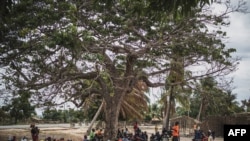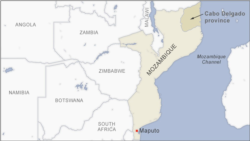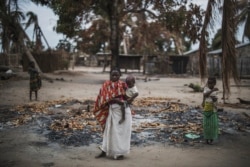Security forces in Mozambique continue to curb a growing Islamist insurgency in the northern part of the country, where violence has killed hundreds of civilians and forced thousands to flee their homes.
Since 2017, Islamist militants, some of which are affiliated with the Islamic State terror group, have carried out attacks against civilians and government security forces in the northern province of Cabo Delgado.
According to the United Nations, 11 of the 16 districts in the Muslim-majority province have experienced attacks claimed by the insurgents. Locally known as al-Shabab, Ahlu Sunna wa Jama is the main militant group responsible for the attacks in Cabo Delgado. It is considered the Mozambique affiliate of IS.
Exploiting grievances
Experts say Islamist insurgents have exploited social and economic grievances of the local population in the resource-rich region.
"The insurgents seem to grow in areas where the population has been marginalized by the government, particularly young people, who in some cases sold what little they had and went to join the [armed] groups," said José Mateus M. Katupha, associate professor at Eduardo Mondlane University in Pemba, the provincial capital of Cabo Delgado.
During a webinar Tuesday hosted by Chatham House, a London think tank, Katupha said Islamist militants have been able to set up "an efficient network of logistics and information-gathering formed by young people inserted into the community."
He added that these networks provide critical information about the movement of government security forces in the region.
Ignoring root causes
Some experts argue that since the inception of the insurgency in Cabo Delgado, the Mozambique government has not been able to identify the root causes of radicalization in that part of the country.
"The government should not hinder the work of journalists, researchers and civil society groups to collect the whole story from both sides of the conflict in order to understand the root causes of this problem," Liazzat Bonate, a lecturer at the University of the West Indies in Trinidad and Tobago, said during the webinar.
She charged that Mozambican authorities have sought help from others, including private security companies and mercenaries, "instead of engaging with their own citizens. If the situation has worsened in the last three years, it indicates that probably the government strategies were wrong."
Regional support
Other experts stress that Mozambican armed forces have had difficulties providing adequate security in northern Mozambique.
When the militants attacked the districts of Mocimboa da Praia and Quissanga in late March, the Mozambican military could not defend the areas, where insurgents briefly took control of government buildings.
Alex Vines, director of the Africa program at Chatham House, said the current security crisis requires the government to develop short-, medium- and long-term strategies.
"After a series of setbacks in April, the government has pushed back the insurgency. And there are signs of some improvement both internally, but also getting neighbors, and particularly Tanzania, to assist in counterinsurgency efforts," he told VOA.
Tanzania, which borders Cabo Delgado to the north, recently deployed troops to the border area to prevent a spillover of the unfolding violence in the northern Mozambican province. Some of the militants fighting in Mozambique are allegedly Tanzanian nationals.
Mozambique reportedly has also been in talks with neighboring South Africa for possible support in combating the militants.
During the U.K.-Africa Summit in January, Mozambican President Filipe Nyusi asked for foreign assistance to counter the insurgency. This month, he again requested regional support.
In the long run, "the government will need to improve the military units deployed and focus on community development," Vines said, adding that Mozambique could learn from similar conflicts in other regions such as the Sahel, Great Lakes and the Middle East.
"There is obviously a short-term need for an effective military response to the insurgency, but longer term, this needs to be backed up with an effective developmental strategy that reduces poverty, provides jobs and shows that the state offers public goods," he said.
Pedro Esteves, a managing partner at Africa Monitor in Lisbon, has similar views.
"First, we have to solve the problem militarily. But then, we have to have political and humanitarian approaches," he said during the webinar.
Esteves added that regional support is needed, "but there are many domestic and internal factors influencing what's going on in Cabo Delgado. So, the solution must be internal."






